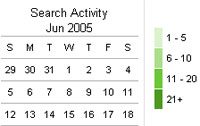 Google has launched an updated beta version of its personalised search tool that learns from your history of searches and search results you’ve clicked on, shuffling more relevant results to the top of the page.
Google has launched an updated beta version of its personalised search tool that learns from your history of searches and search results you’ve clicked on, shuffling more relevant results to the top of the page.
Here’s how it works: if a mad keen boozer was always searching for man-sized glasses to sup his ale from, Google would learn from his search history with future searches for the keyword “glasses” automatically serving up glass-related results, while ignoring results for the four-eyed variety.
Similarly, if the surfer was a teetotaller with an Elton John-like obsession with spectacles, Google would only serve up spec-related results and links when they searched for “glasses”.
According to Google’s Marissa Mayer, the more users search and build up a search history the better the results will become.
“We need to have a history of the user,” Mayer added. “When people first sign up they may not see results right away, but it will build over time.”
Consumers need to have a Google account for the free service and those using the previous version of the personalised search service will automatically be switched to the new version.
The service only works when the user is signed on to their Google account.
 Clearly, there could be a shedload of potential privacy concerns here with the search history feature compiling a detailed list of every page you’ve ever searched for, but sneaky surfers hoping for a bit of discrete titillation can sign out of the personalised search service, pause it or remove it through their accounts page.
Clearly, there could be a shedload of potential privacy concerns here with the search history feature compiling a detailed list of every page you’ve ever searched for, but sneaky surfers hoping for a bit of discrete titillation can sign out of the personalised search service, pause it or remove it through their accounts page.
Furtive track-coverers can also remove individual items from their search history as well.
This latest personalised search beta is a refinement of the previous version, launched in March 2004, which only customised searches after users had manually selected categories of interest.
Like all Google public betas, the new personalised search service is currently sitting in Google Labs, described by the company as an “engineer’s playground”.
Mayer said she could not speculate on when a final version will be launched, adding that Google will not be customising advertisements based on the personalised search.
This latest search development reflects Google’s drive to let users customise their Web experiences, and follows on from the personalised Google home page feature introduced in May.